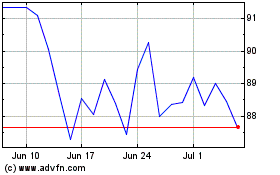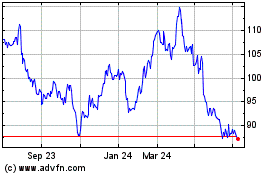China Keeps Germany's Car Makers in the Fast Lane -- Heard on the Street
May 20 2020 - 5:20AM
Dow Jones News
By Stephen Wilmot
Germany's car manufacturers are once again being bailed out by
China.
Having skidded to a halt in February, Chinese vehicle sales are
rebounding -- particularly at the luxury end of the market. Premium
brands clocked year-over-year growth of 13.6% in April, according
to insurance sales tracked by brokerage Bernstein, bringing the
decline for the first four coronavirus-stricken months of 2020 to
just 14.2%. Bernstein's feedback from dealers suggests demand
remains strong this month.
Volkswagen, which owns the Porsche and Audi brands,
Mercedes-maker Daimler and BMW dominate the field in China just as
they do elsewhere -- only more so. Jürgen Pieper, an analyst at
private German bank Metzler, estimates their combined share of the
country's luxury-car market is more than 90%, versus roughly 85%
globally.
It seems counterintuitive that a sales recovery should be led by
products that are more status symbols than everyday necessities.
China's wider car market has been shrinking since mid-2018, though,
even as premium sales have kept growing. In previous years, the
segment's resilience seemed linked to consumers' funding sources:
Mass-market brands were more dependent on shadow finance and
subsidies, on which Beijing was trying to clamp down.
This year, the uncomfortable truth may be that, in China as in
the U.S., the tech-enabled affluent class that might buy a BMW or
Mercedes is less economically affected by the health crisis than
the blue-collar workers that make them. Social distancing has also
given those with means an extra reason to buy a vehicle. China has
excellent public transport, but people are nervous about using it,
subway use last week was down about 40% year over year.
The luxury-car boom in China is in little danger of running out
of road. Car ownership in the country is still far below levels in
the West. Premium brands account for just 15.3% of total sales
nationwide, according to Goldman Sachs -- up from 9.6% in 2016, but
far below the level of the top coastal cities (25% to 29%), let
alone luxury hot spot Hong Kong (52%).
The rise of China may be the single biggest reason why Germany's
auto stocks -- cost-heavy Daimler aside -- have massively
outperformed U.S. peers and the wider European stock market over
the past two decades. China kept them in business in the 2009
crisis and will help them through the current one. The country
usually contributes roughly 35% and 50% of their profits, estimates
Michael Muders, a portfolio manager at Frankfurt-based Union
Investment.
This long-term growth story comes with challenges. An increasing
share of the vehicles that the companies sell in China are made by
local joint ventures of which they only own half. BMW signed a
landmark deal in 2018 to increase its stake in its key joint
venture to 75%, but it still hasn't completed it. Meanwhile, the
car industry in Germany itself has suffered from years of
production cuts. The combination of growth in Chinese factories
they can never really control with a slow decline at home will only
get more awkward politically.
Still, their enduring appeal to China's confident elite puts
Germany's manufacturers in a league of their own for investors
within the otherwise risk-laden global auto sector. This year the
difference will be more obvious than ever.
Write to Stephen Wilmot at stephen.wilmot@wsj.com
(END) Dow Jones Newswires
May 20, 2020 05:05 ET (09:05 GMT)
Copyright (c) 2020 Dow Jones & Company, Inc.
Bayerische Motoren Werke (TG:BMW)
Historical Stock Chart
From Mar 2024 to Apr 2024

Bayerische Motoren Werke (TG:BMW)
Historical Stock Chart
From Apr 2023 to Apr 2024
